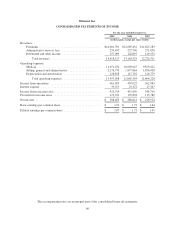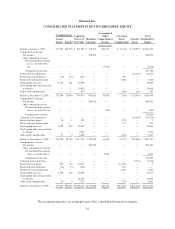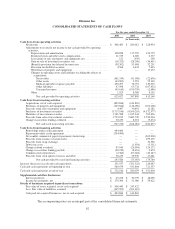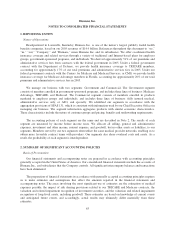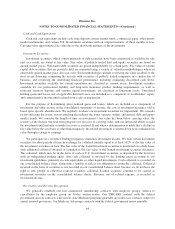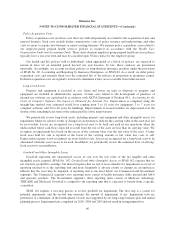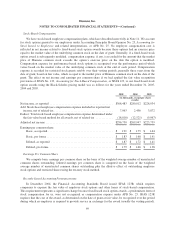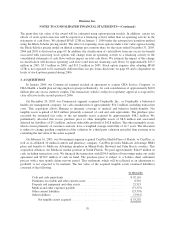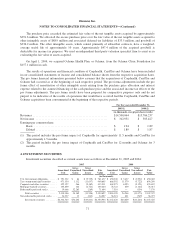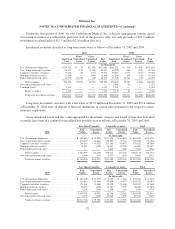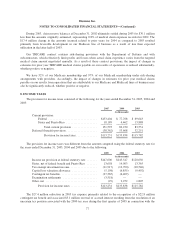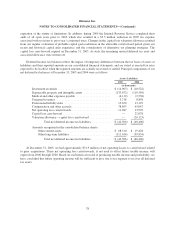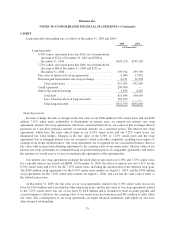Humana 2005 Annual Report Download - page 79
Download and view the complete annual report
Please find page 79 of the 2005 Humana annual report below. You can navigate through the pages in the report by either clicking on the pages listed below, or by using the keyword search tool below to find specific information within the annual report.
Humana Inc.
NOTES TO CONSOLIDATED FINANCIAL STATEMENTS—(Continued)
Stock-Based Compensation
We have stock-based employee compensation plans, which are described more fully in Note 11. We account
for stock options granted to our employees under Accounting Principles Board Opinion No. 25, Accounting for
Stock Issued to Employees and related interpretations, or APB No. 25. No employee compensation cost is
reflected in net income related to fixed-based stock option awards because these options had an exercise price
equal to the market value of the underlying common stock on the date of grant. Generally, if a fixed-based stock
option award is subsequently modified, compensation expense, if any, is recorded for the amount that the market
price of Humana common stock exceeds the option’s exercise price on the date the option is modified.
Compensation expense for performance-based stock options is recognized over the performance period which
varies based on the market value of the underlying common stock at the end of each period. Compensation
expense is recorded for restricted stock grants ratably over their vesting periods, generally three years from the
date of grant, based on fair value, which is equal to the market price of Humana common stock on the date of the
grant. The effect on net income and earnings per common share if we had applied the fair value recognition
provisions of SFAS No. 123, Accounting for Stock-Based Compensation, or SFAS 123, to our fixed-based stock
option awards using the Black-Scholes pricing model was as follows for the years ended December 31, 2005,
2004 and 2003.
2005 2004 2003
(in thousands, except per share
results)
Net income, as reported ........................................... $308,483 $280,012 $228,934
Add: Stock-based employee compensation expense included in reported net
income, net of related tax ........................................ 7,063 2,456 3,872
Deduct: Total stock-based employee compensation expense determined under
the fair value based method for all awards, net of related tax ............ (18,816) (12,521) (9,067)
Adjusted net income .............................................. $296,730 $269,947 $223,739
Earnings per common share:
Basic, as reported ............................................ $ 1.91 $ 1.75 $ 1.44
Basic, pro forma ............................................. $ 1.83 $ 1.68 $ 1.41
Diluted, as reported .......................................... $ 1.87 $ 1.72 $ 1.41
Diluted, pro forma ........................................... $ 1.79 $ 1.66 $ 1.38
Earnings Per Common Share
We compute basic earnings per common share on the basis of the weighted average number of unrestricted
common shares outstanding. Diluted earnings per common share is computed on the basis of the weighted
average number of unrestricted common shares outstanding plus the dilutive effect of outstanding employee
stock options and restricted shares using the treasury stock method.
Recently Issued Accounting Pronouncements
In December 2004, the Financial Accounting Standards Board issued SFAS 123R, which requires
companies to expense the fair value of employee stock options and other forms of stock-based compensation.
This requirement represents a significant change because fixed-based stock option awards, a predominate form of
stock compensation for us, were not recognized as compensation expense under APB No. 25. SFAS 123R
requires that the cost of the award, as determined on the date of grant at fair value, be recognized over the period
during which an employee is required to provide service in exchange for the award (usually the vesting period).
69



